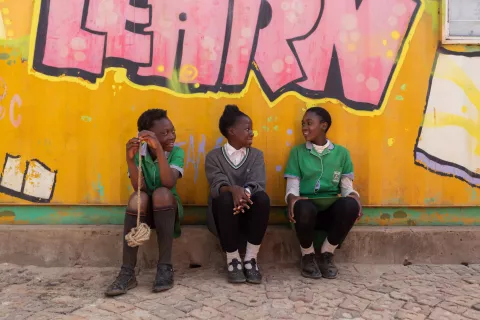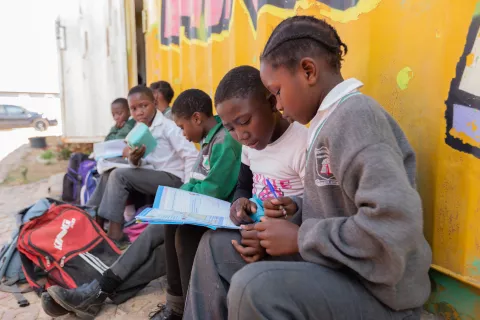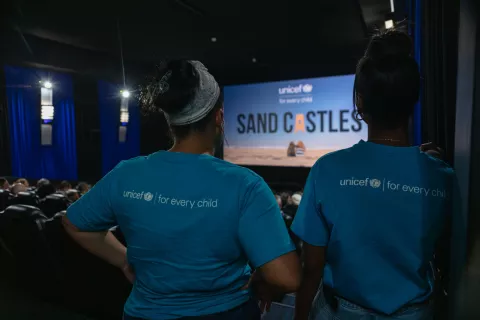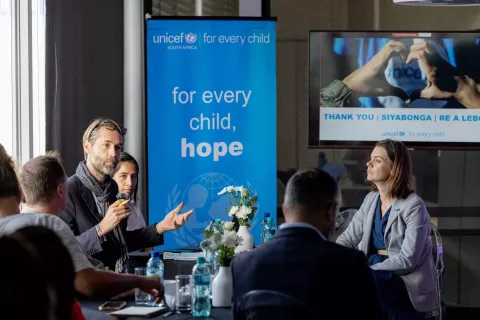Remarks by UNICEF South Africa Deputy Representative, Muriel Mafico at the roundtable discussion on improving mental health and psychosocial support for adolescents and young people in South Africa
As prepared for delivery
Ms Jeanette, Hunter, DDG for General Primary Health Care in the National Department of Health,
Dr Gustaaf Wolfaardt, Managing Director of FPD, presenters, partners, colleagues
Mental ill-health: a public threat
Mental health problems in childhood and adolescents pose a major threat to public health in South Africa. A systematic review, conducted by Jörns-Presentati et. al in 2021 found prevalence estimates ranging between 21% and 41% for a range of mental problems in adolescents and young people including emotional and behavioural problems, anxiety disorders, depression, post-traumatic stress disorder and suicidal thoughts. Concerning is that most of the studies from this systematic review were from South Africa.
Defining mental health as a continuum
But what does the concept “mental health” refer to? WHO defines mental health as “a state of well-being in which all people can realize their potential, to cope with the normal stresses of life, to [learn and] work productively, and contribute to their community.” Just over one month ago we commemorated Mental Health Awareness Day. Mental health is a basic human right and critical for general health and well-being of populations, including children, adolescents and young people.
Drivers of poor mental health
Children and adolescents in this country face numerous challenges that impact their mental wellbeing, including individual, social, and environmental factors. Children are exposed to high levels of community violence, child maltreatment, HIV and GBV. Not feeling safe has a significant impact on the well-being of children and adolescents. HIV infection is a risk factor for poor mental health and evidence shows that children and adolescents living in households affected by HIV and AIDS are at increased risk of psychological disorders. Evidence shows that younger women are at higher risk of intimate partner violence and sexual violence compared to older women with associations with depressive symptoms and suicidal ideation.
Following the gender-based violence summit we know all know that one in every four ever partnered adolescent girls aged 15-19 years is estimated to have already been subjected to physical and/or sexual violence from IPV at least once in their lifetime. Structural drivers such as poverty, violence, exclusion, inequities, and discrimination further impact the mental health of families. Families living under conditions of overwhelming stress and hardship or experiencing shocks, such as flooding or economic adversities are more vulnerable to poor mental health outcomes.
Diet and exercise play and important role in the wellbeing of young children. This is partly caused by unhealthy diets and lack of physical activity and has close interactions with body dissatisfaction and self-esteem. Evidence shows that 13% of children under five years and 60% of females between the ages of 20-24 years in South Africa are overweight or obese and that unhealthy diets, food insecurity, physical inactivity, obesity, vitamin D deficiency, body dissatisfaction and sleep disturbances have a negative impact on mental health. The prevalence of substance use disorders (SUD) in South African adolescents are unknown but a high proportion of patients who present at substance abuse clinics are under 20 years of age.
In addition, the internet exposes children and adolescents to the risk of abuse and exploitation and contributes to negative experiences such as bullying and harassment and incitement to self-harm or suicide. Children and adolescents who experience violence, sexual abuse and bullying are at increased risk of poor mental health outcomes and poor educational outcomes.
Impact of poor mental health
Untreated mental disorders impact on functioning, relationships, risk behaviour, health, education, productivity, and care of the next generation. This has enormous social and economic costs across the life course and for the next generation of children.
COVID-19, and its associated social restrictions and lockdown measures have adversely affected the mental health of children, adolescents and young people in South Africa. Being confined to a small space and not being able to maintain school and regular social connections can lead to various negative mental health effects for young people which are exacerbated for those with existing mental health conditions and those living in poverty and in contexts of food insecurity. Evidence from past crises and economic shocks suggests that mental health impacts endure well beyond the crisis periods with young people more likely to take high-risk jobs in which they might experience violence and exploitation.
The response: an integrated multi-sectoral approach
It is clear from the description of the complex web of drivers of poor mental health that an integrated, intersectoral approach is required for improving the prevention, treatment, and care of mental ill-health in children and adolescents. All sectors, including government, business, academia, and civil society need to work closely with communities and each other to address the mental health challenges of children and adolescents. Centre to all our efforts must be the participation of children and young people, ensuring that all interventions are child and youth friendly.
While we recognise the work done by individual actors in policy and programme development and the important first steps that have been taken towards multi-sectoral collaboration at the national level, we acknowledge that much work still needs to be done. Present at today’s roundtable discussion are young people and stakeholders from different sectors and government levels, taking that very important first step towards cascading collaboration down to provincial, district and community level.
Conclusion
UNICEF, in partnership with the National Department of Health and the Foundation for Professional Development, is pleased to have brought together government departments, business, civil society, academia and our young people around one table today to strengthen our collaboration to improve the mental health and psycho-social support services for children and youth in South Africa. We look forward to the presentations and discussions as we intensify our work with all sectors to develop action plans from these roundtable recommendations.
I thank you and wish you well with your deliberations.
I thank you
Delivered on Wednesday, 16 November 2022, Foundation for Professional Development, Pretoria
Media contacts
About UNICEF
UNICEF works in some of the world’s toughest places, to reach the world’s most disadvantaged children. Across more than 190 countries and territories, we work for every child, everywhere, to build a better world for everyone.
Follow UNICEF South Africa on Twitter, Facebook, Instagram, YouTube and LinkedIn




